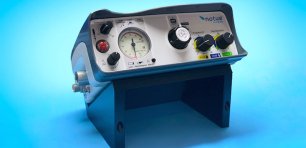
Minister for Industry, Science and Technology Karen Andrews speaks during a funding announcement in Adelaide, on Monday, April 15, 2019. Source: AAP Image/Mick Tsikas.
Ministerial oversight. A government board stacked with company directors. Are we witnessing yet another rort in the making?
Amid the buckets of cash being thrown at the economy this year, you might have missed the $1.5 billion manufacturing scheme announced by the prime minister last month that promises to “transform Australian manufacturing” and “rebuild our economy”.
Putting aside the fact that most of the money won’t be available until next financial year when Australia hopes to be out of recession, governance experts say they are “shocked” by what appears to be another grants program with little or no independent oversight.
At the centre of the policy is a $1.3 billion grants scheme from which the government will hand cash to a select number of large manufacturing projects with a focus on six “priority sectors”: resources technology; food and beverage manufacturing; medical products; clean energy and recycling; defence; and space.
It will also give money to small and medium businesses that want to scale up their manufacturing to create jobs.
Industry Minister Karen Andrews is in charge of the scheme and told Insiders last week she would have the final say on which businesses in which electorates would receive funding — a startling statement given the obvious risk to grants being politicised when they are run out of political offices.
“Those decisions will come to me,” she said.
“But they will be based on the advice of an advisory board which is Industry, Innovation and Science Australia (IISA) with input from CSIRO.”
Yee-Fui Ng, a governance expert at Monash University, said the scheme risked being rorted without proper oversight.
“If there’s no proper probity and procurement process, it does run the risk of becoming yet another way to channel funds to certain electorates,” he says.
The government has quietly stacked the IISA board with company directors since making the announcement last month.
The five new members all hold senior positions in business, raising concerns about conflicts of interest.
One appointment, Lauren Stafford, is a senior manager at Woodside Energy. She was also a member of the Minerals Council of Australia’s board between 2016 and 2019.
The other appointments are Patrick Houlihan, the chairman and CEO of DuluxGroup; Scott Farrell, a partner at law firm King & Wood Mallesons; Sarah Nolet, the CEO of AgThentic and venture capital firm Tenacious Ventures; and Alex Grant, CEO of space technology firm Myriota.
The Department of Industry, Science, Energy and Resources said IISA had rigorous conflict of interest processes which all board members had to adhere to.
“Close industry engagement during the development of the modern manufacturing strategy will ensure that the strategy is both relevant and effective,” the department said.
So is this another rort in the making?
Ng said the close involvement of industry raised further governance issues.
“When self-interested industry groups have the power to decide on government policies, that doesn’t necessarily lead to an impartial or objective outcome,” he says.
“It’s quite shocking that the ministers can get away with expanding public funds like this without proper oversight.”
This article was first published by Crikey.
Handpicked for you

Can Australian-made products compete on price?



COMMENTS
SmartCompany is committed to hosting lively discussions. Help us keep the conversation useful, interesting and welcoming. We aim to publish comments quickly in the interest of promoting robust conversation, but we’re a small team and we deploy filters to protect against legal risk. Occasionally your comment may be held up while it is being reviewed, but we’re working as fast as we can to keep the conversation rolling.
The SmartCompany comment section is members-only content. Please subscribe to leave a comment.
The SmartCompany comment section is members-only content. Please login to leave a comment.